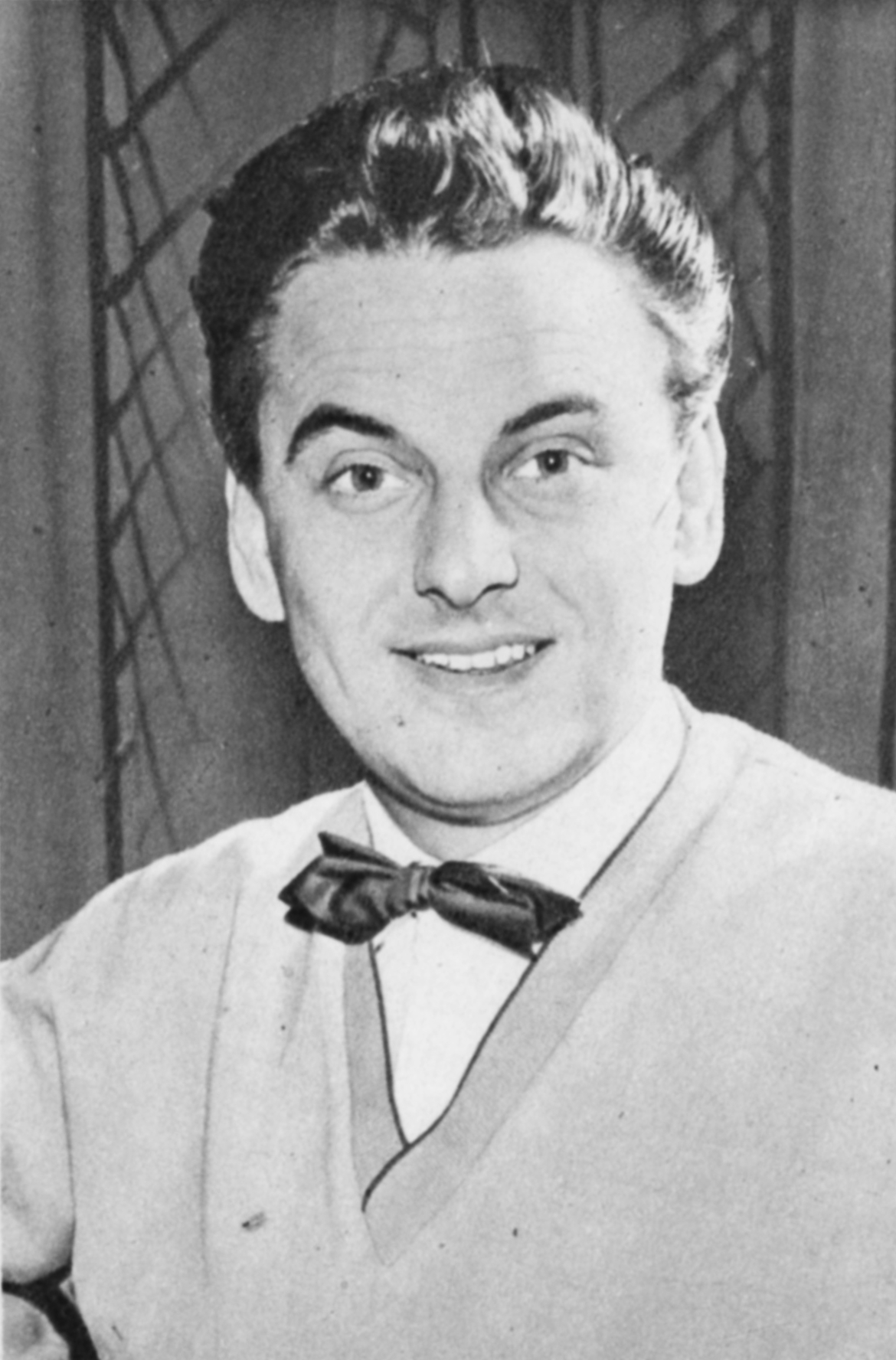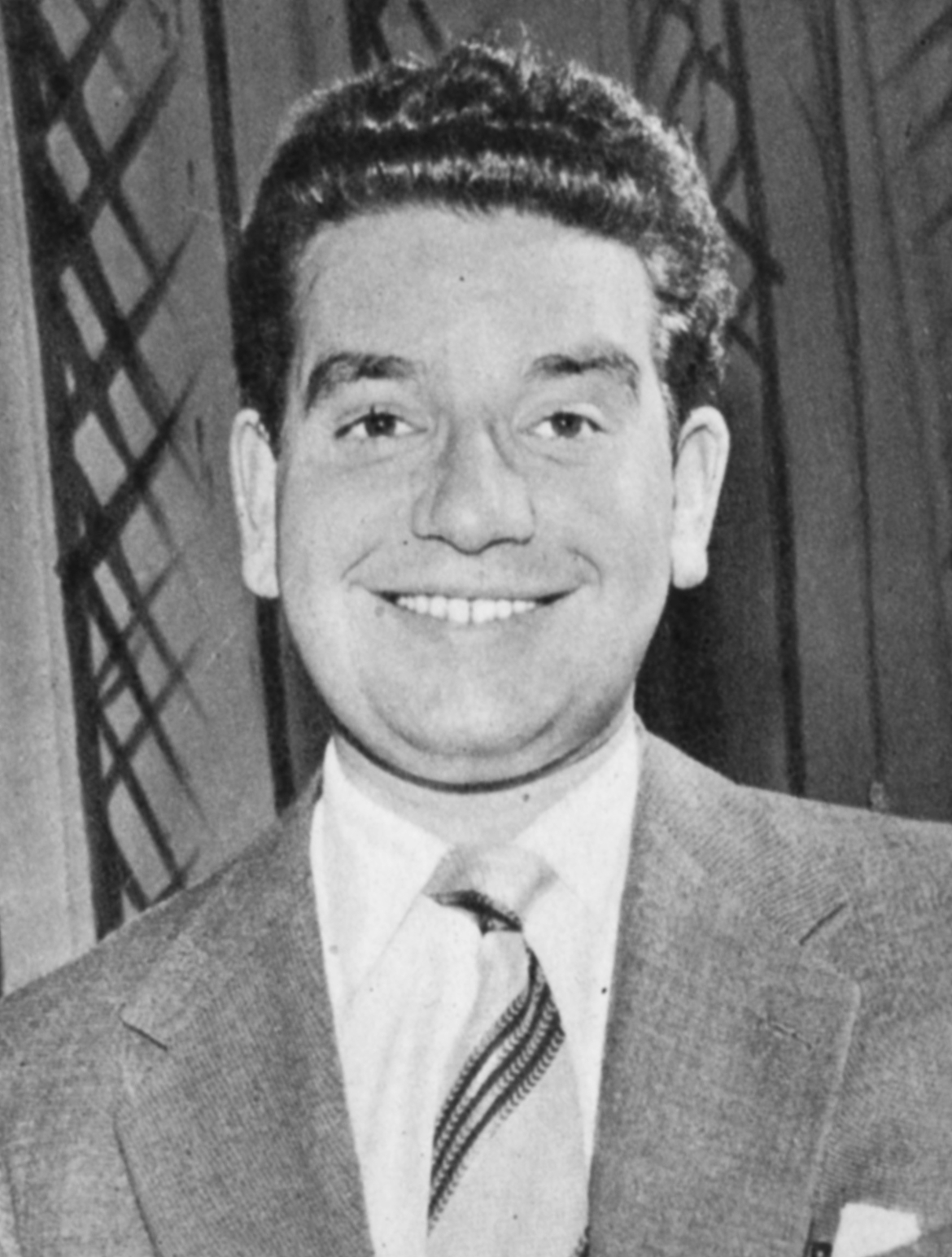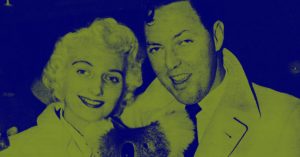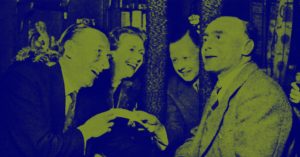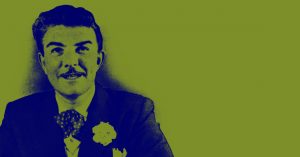The Young Stars
Top-liners of tomorrow

Top-liners of tomorrow
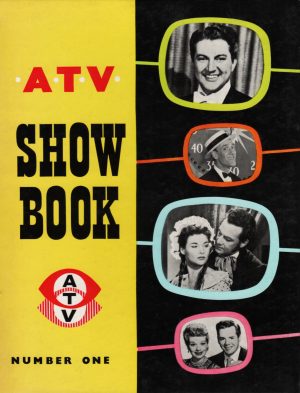
No show book is complete without some mention of the young stars who are just beginning to hit the headlines and who will be the top names in the years to come.
Few people have a more exciting tale to tell than another Dominion born artiste, thirty-year old Australian, Vincent Ball. Vincent is the hero of thousands of children – and of a good many housewives too. To his amazement (for Vincent is a modest young man) he receives an enormous amount of fan-mail every week. The people who help him answer this mail have aptly nicknamed him ‘The Housewives’ Heart-Throb’, much to his own disgust.
During the war, Vincent was in England as a pilot in the Australian Air Force. In 1945, he returned to his native land and to his job with the Australian General Electric Company. For open-air Vincent Ball, an office was not the most congenial way to earn a living. He attempted all sorts of indoor work including accountancy after his return from the war, but none of it really suited him. Vincent felt a continual nagging for the footlights. He had even been to evening classes to study elocution. ‘My dialect was a shocking mixture of anything from Cockney (the influence of my London stay), to Canadian (learnt from my service days with the Canadians).’
He was given a special teacher of elocution all to himself. This teacher is now Doreen Ball. Between them they have produced a lovely daughter called Catherine, now aged three and a half. She couldn’t care less about seeing her Dad on TV but she does like Noddy, which he introduces.
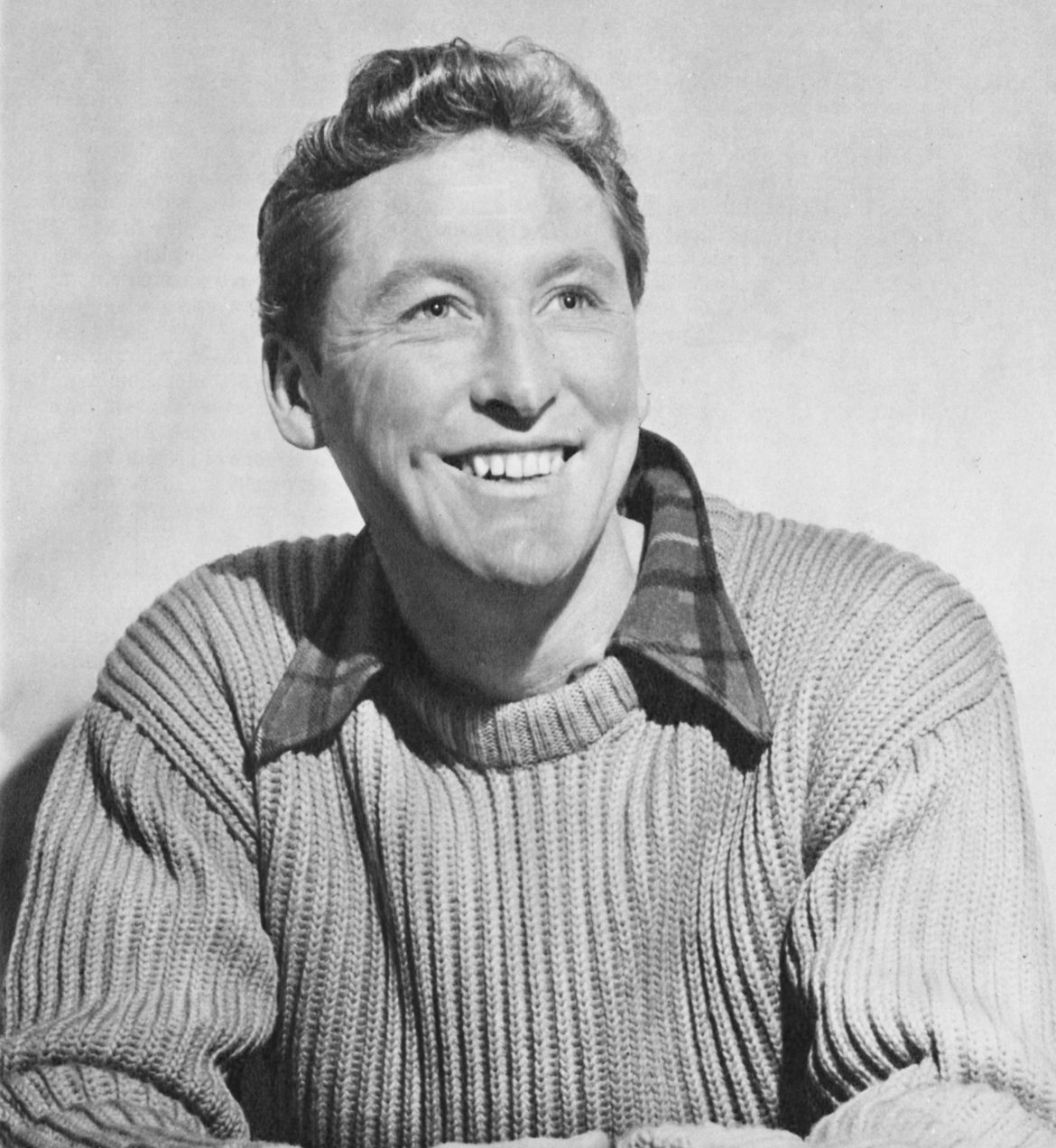
With his improvement in diction came confidence, and the frustration of office jobs led Vincent to apply for an audition for a part in The Blue Lagoon. Back came a letter from the Rank Organisation saying, ‘We would love to have you but you are 13,000 miles away … if you are ever in our neighbourhood do please drop in and see us’.
This was good enough for Vincent. He went down to the docks and stoked his way to Europe. The trip should have taken six weeks but the Swedish ship Yarawonga wasn’t in a hurry and the journey to Sweden took the best part of six months. By the time Vincent knocked on the door of the Rank office, with his half-year old letter in his pocket, the Lagoon Company had been to Fiji on location and back, and all but a few indoor shots were in the can. However, Vincent’s tenacity was not to go unrewarded. He was allowed to stand in for Donald Houston in an underwater fight with an octopus. The first words the director, Frank Landau, said to him were, ‘Don’t let the camera see your face, you’re only a stand-in’.
But stand-in or no, it was a start. After this first film Vincent won a scholarship to the Royal Academy of Dramatic Art and a five pound a week grant. He then went from Rep. to the juvenile lead in Rain Before Seven, Barnetts’ Folly and Nitro, before making a big film. This time he had a large part as Peter Finch’s pal in A Town Like Alice.
When he had lived in Carshalton he had often amused the local kids by telling them stories about Australia. Now, when he was asked how he would fill his first nine minutes on Junior Television, he said he would tell similar stories. His powers as a raconteur have gained Vincent quite a name and a regular weekly newspaper column besides. And if you ever had the fortune to spend even a few minutes with him between one of his four weekly shows, you would realize just how bewitching a storyteller Vincent really is.
A real nice guy is Vincent Ball – just as nice as the film heroes he introduces. Success has left him completely unaffected, and this with his talent and pertinacity ensure that Vincent should be a star in his own right before many more pages of the calendar are turned.
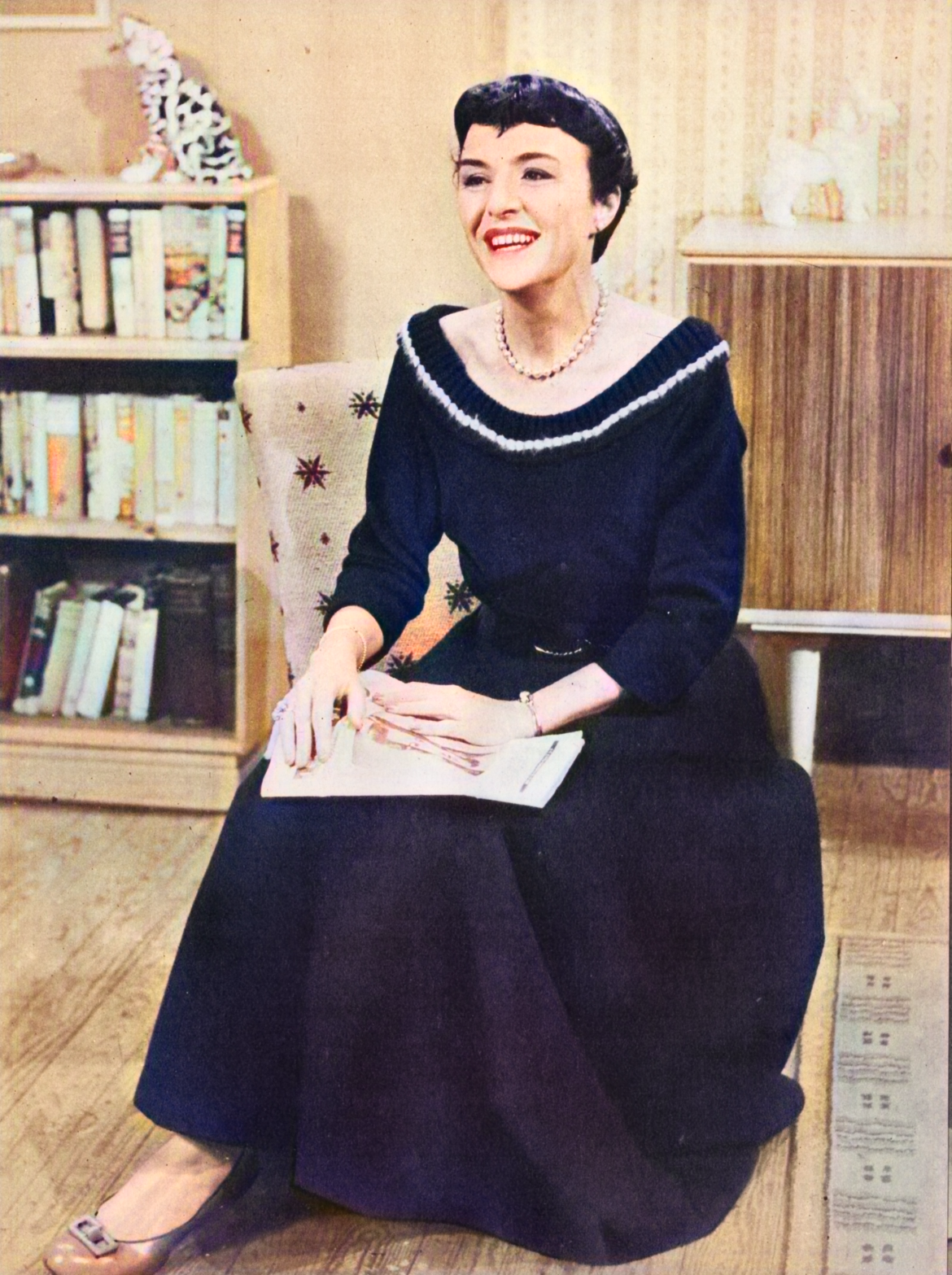
Femininity is the keynote of bachelor girl, Noele Gordon, producer of women’s programmes. It sparkles from her large blue eyes, radiates with every movement of her restless hands, and is highlighted in the bold accessories chosen to complement her chic, simple clothes and short black hair.
Noele’s talents are not confined to producing. Her crowded week includes personal appearances in Lunch Box, a daily programme, About Homes and Gardens, Teatime with Gordon, and the new London programme, Musical Cheers.
Within minutes a conversation with Noele becomes an assured and witty chat with an ‘old friend’. Her vivid personality can charm words from the inarticulate and quips from sage speakers. Ideas tumble from her pert mouth at bewildering speed and the most placid event becomes an adventure when she lends a hand.
‘I was born,’ she says with a saucy grin, ‘at an early age in London of Scottish parents. I made my first public appearance at the age of 2½ years.’
From then on Noele seemed fated to a life in show business. She studied at RADA and made her first professional appearance in Rep. in Edinburgh. She had no lines to speak as the maid in One Hundred Years Old, but she had to give a loud scream in Act 2.
‘That,’ she says, ‘has been my reaction to show business ever since.’
But that first scream must have been executed with full dramatic vigour, for since those early Repertory days, Noele has appeared in some of London’s most successful shows.
The late George Black chose her for parts in Let’s Face It and The Lisbon Story. The late C. B. Cochrane put her into Big Ben at the Adelphi theatre.
Her thousand performances as Meg Brockie in Brigadoon at Her Majesty’s Theatre remain indelible memories and were followed in 1949 by a Royal Command Performance at the Coliseum.
The two following years saw her as the Principal Boy in the London Palladium’s Humpty Dumpty pantomime, and as Mrs. Sally Adams in Call Madam at the Coliseum and on tour.
Then, when Commercial Television became a reality, Noele joined the pioneer ranks as one of ATV’s women’s programmes producers.
‘That title,’ she admits, ‘is a little misleading. Not only have I produced, but I’ve toured the Midlands in search of programme ideas, visited Town Halls, Civic Centres, Women’s Guilds and told people what they could expect when we opened in Birmingham.’
The Midlands area is almost Noele’s second home. She played her first important role in the Theatre Royal, Birmingham.
‘It’s a wonderful thing,’ she says, ‘but do you know. Midland folk remember my performances in Cinderella and Dick Whittington at the Alexandra Theatre despite all the other shows they’ve seen. Why, when I was addressing one Women’s Guild a member said, “What became of that gorgeous ’white horse in your panto?’”
‘That was quite a while ago,’ says Noele, ‘but they remember just what I wore. That horse, by the way, was the only “artiste” I’ve ever worked with that was completely without temperament! It weighed about three tons, and every time it thundered on to the stage, the house lights went out!’
Commercial Television was not an unknown quantity to Noele before she experienced it in this country. After she left the stage she visited America to study television methods there. The technical knowledge gleaned by perseverance, determination and sheer hard work, stood her in good stead when she joined Associated TeleVision. With her experience of the slick, fast-moving American TV programmes and her love of English tradition, her judgement has become a watchword at Television House.
It is only to be expected that such a vibrant personality as Noele’s would call for some ‘out of the rut’ hobbies. ‘I love bullfighting and cricket – but only as a spectator. My active hobby is under-water fishing – wonderful sport!’
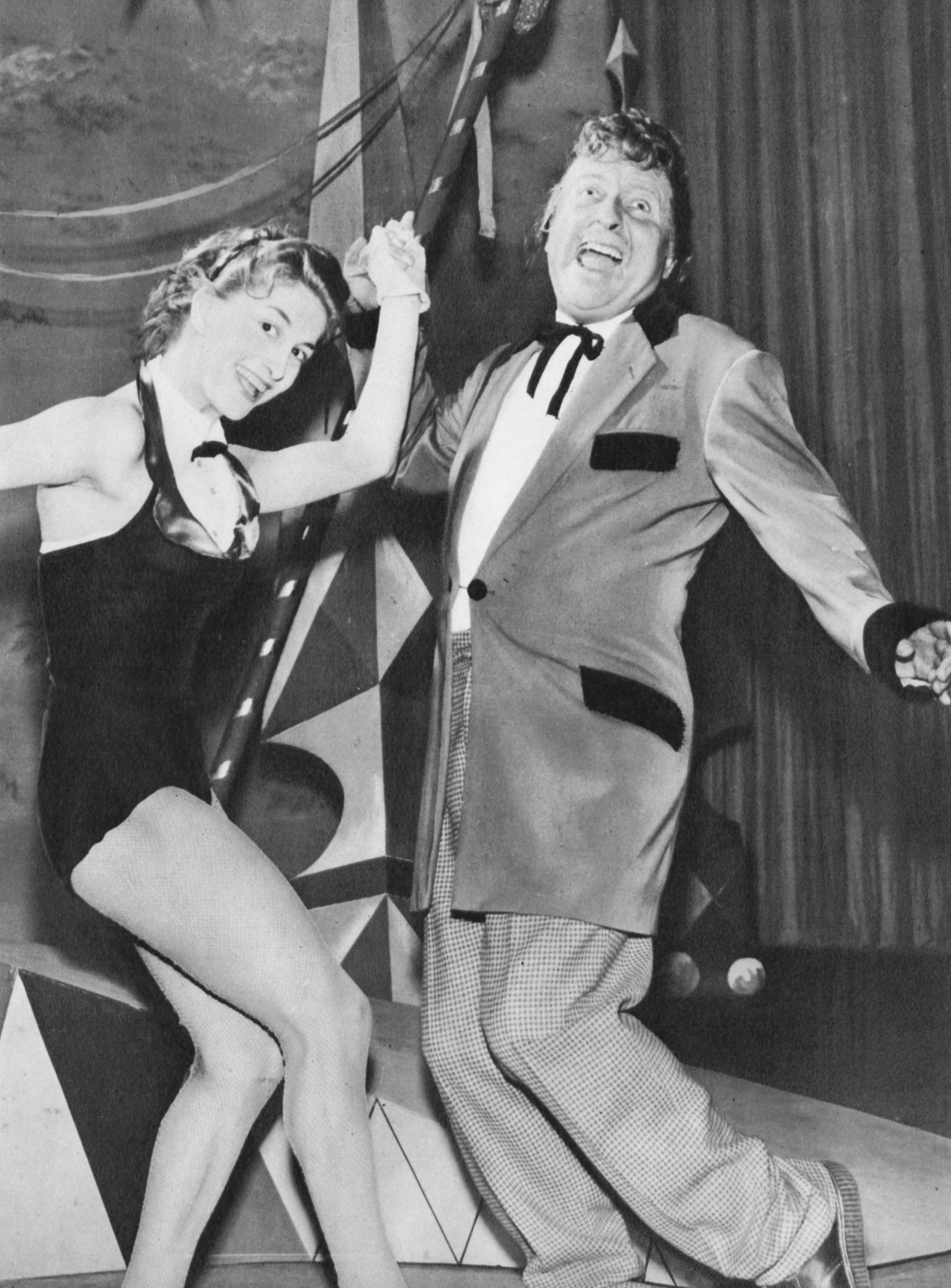
One of the brightest stars on the television comedy horizon is Arthur Haynes. He is not a teen-or-twenty discovery, in fact he has been touring the variety world for many years, but suddenly through the medium of TV he has found himself a potential star of the future, and ‘I just can’t believe my good fortune,’ he says.
His first professional engagement was a booking as an entertainer in a Camden Town public house, where he was paid 5s. for singing two songs. As a troop entertainer during the war, Arthur teamed up with Charlie Chester, and the officer in charge of the fun-making was Captain George Black.
Arthur stayed with Charlie Chester for six years before branching out on his own, but no one took much notice of him. Weeks followed when he was unemployed, and finally ex-Sergeant Haynes went to visit the office of his ex-Captain. ‘What do you think of my act?’ he asked. ‘Terrible,’ said Showman Black. But Arthur was given his chance just the same.
When George and Alfred Black were presenting a brand new television series, they remembered Arthur and included him in the resident team for the series. Arthur introduced a new character to the viewers, ‘Oscar’, the little man who couldn’t help being a pest. The public loved Oscar, and the result was Arthur’s own TV series in the Midlands, where Oscar has become a household word.
Arthur lives just outside London with his wife and his vast collection of ‘mugs’. ‘I’ve got over 800 of them,’ he says, ‘in every shape and design possible. There are china mugs, pewter mugs, and every one is my favourite size – they’re all pint pots.’
When Arthur Haynes was offered a television series he expected to be ‘doing only bits and pieces – helping others out’. But Arthur and his bits and pieces, combined with his wide range of facial expressions and characterizations have made him a television favourite.
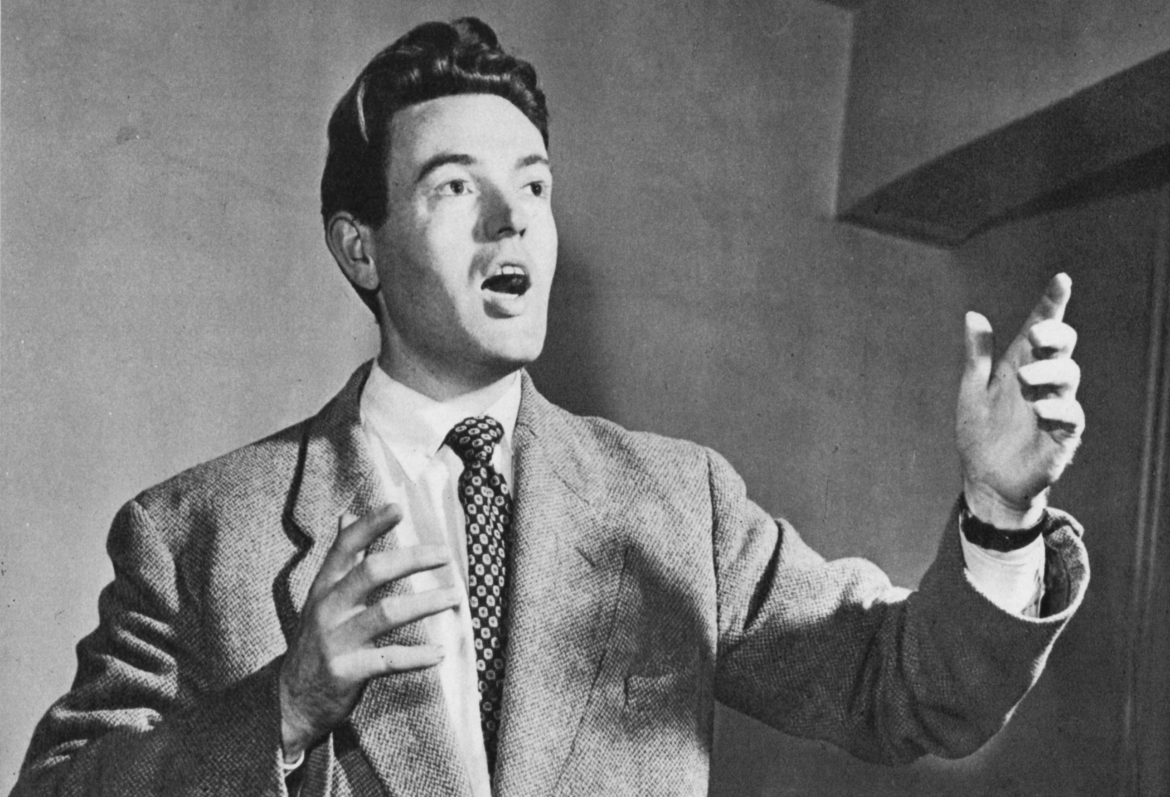
A chance to reach for stardom was given to ‘backroom boy’ David ‘Johnny’ Galbraith, a 29-year-old Canadian who lives in Birmingham, and who was a studio manager behind the TV cameras.
David had never mentioned to his colleagues that he had understudied for Mario Lanza during the filming of Because You’re Mine, or that he had toured American western states in Oklahoma. He had married Joan, an adagio skater, and now had a young son, David. His television job was nice and steady and he had reluctantly given up ideas of stardom. But he couldn’t stop singing, and one day at the studio he was heard by Noele Gordon. Noele was impressed by his fine singing voice, and invited him to appear on her own programme. Within minutes of his first appearance, viewers were telephoning the studios asking, ‘who was that man with the wonderful voice?’
Two weeks later, David was again on Noele’s show, and a recording of his voice was sent to Val Parnell. The result was an appearance on Val Parnell’s Startime.
When Noele’s daily Lunch Box programme began, she asked if David could be a regular contributor. Within a month of the first show, the mail was averaging 200 letters a day, half of which mentioned David and asked him to sing requests.
David is one of a large Canadian family. He wanted to be a singer ever since he can remember. His mother gave him every help and arranged for his voice to be trained by opera singer Madame Pauline Donalda, a great friend of the family. After several years touring the States, David visited Europe and appeared in the spectacular production of White Horse Inn on Ice, which went on tour, with the final engagement at Birmingham Hippodrome. It was then that David decided to try for a post at the nearby television studios. On March 6th, 1956, he was appointed assistant scene master, and then promoted to studio manager.
Now he had been signed up by Britain’s leading theatrical agent, and his first stage appearance was booked for October 29th, just eight months after his ‘steady’ job began.
David is an impressive looking singer, six feet tall, with blond hair and blue eyes. He is a great believer in keeping fit, and does half an hour of weight-lifting and shadow-boxing each morning.
Of course there’s a whole host of other names deserving more than a mention^ which we should like to include in this book. There’s Bob Monkhouse, who with Denis Goodwin hardly spends a week away from ATV screens; there’s Glen Mason – as much a part of the Jack Jackson Show as Jack himself… one could go on for ever. But books must have a limit to their size, and we’ve still a lot of ground to cover…
About the author
The ATV Show Book (later editions were not sponsored by ATV) was an annual produced in the late 1950s and early 1960s

